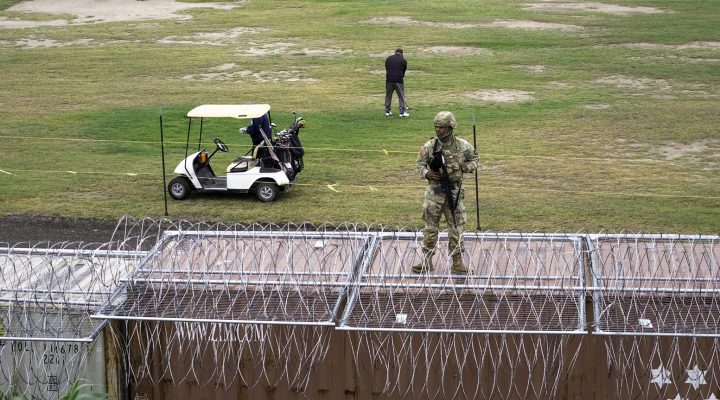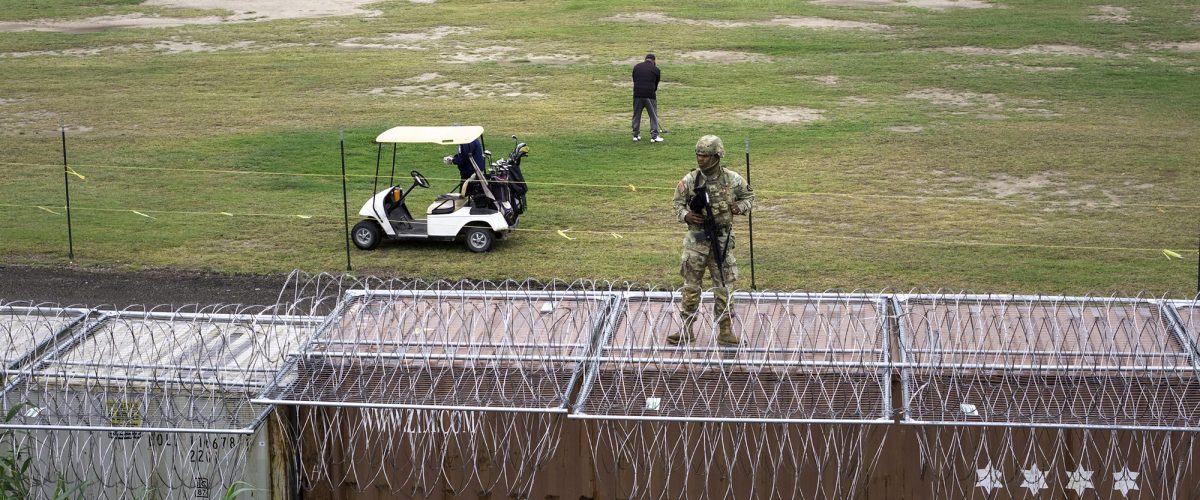A federal court barred Texas late March 19 from implementing a new law that enables state law enforcement officers to arrest and deport migrants who illegally cross the border from Mexico.
Fifth U.S. Circuit Court of Appeals issued the hold a only a few hours after the Supreme Court ruled that S.B. 4 could go into effect as litigation against it proceeds. The appellate court’s previous decision to permit implementation triggered the Biden administration appeal which the justices ultimately denied.
Texas currently faces a lawsuit filed against SB-4 last year by the American Civil Liberties Union, ACLU of Texas and Texas Civil Rights Project on behalf of American Gateways, El Paso County and Las Americas Immigrant Advocacy Center. The back-and-forth over S.B.-4’s implementation began in early March when U.S. District Judge David Ezra in Austin initially stayed the measure in deference to federal immigration authority.
Before the appeals court ruling later in the day, March 19 was marked by passionate condemnations of the Supreme Court’s decision giving Texas permission to enact the controversial bill.
In ultimately backing the appellate ruling, justices Amy Coney Barrett and Brett Kavanaugh explained the decision does not address the merits of the case and argued the court’s intervention is presently unnecessary.
But the damage that can result from the immediate implementation of SB-4 should have resulted in upholding the stay against it, justices Ketanji Brown Jackson and Sotomayor responded in the ruling.
“Today, the court invites further chaos and crisis in immigration enforcement.”
“Today, the court invites further chaos and crisis in immigration enforcement. Texas passed a law that directly regulates the entry and removal of noncitizens and explicitly instructs its state courts to disregard any ongoing federal immigration proceedings,” the justices wrote. “That law upends the federal-state balance of power that has existed for over a century, in which the national government has had exclusive authority over entry and removal of noncitizens.”
They added: “This law will disrupt sensitive foreign relations, frustrate the protection of individuals fleeing persecution, hamper active federal enforcement efforts, undermine federal agencies’ ability to detect and monitor imminent security threats, and deter noncitizens from reporting abuse or trafficking.”
Fellowship Southwest and other immigration activists were as disturbed by the ruling as justices Jackson and Sotomayor.
“Fellowship Southwest is disappointed in today’s Supreme Court decision allowing SB-4 to take effect,” the group said in a statement. “We advocated against the law last legislative session in Texas and continue to believe it will ultimately be found unconstitutional. Immigration is a federal issue in dire need of reform, for which we will continue to advocate.”
The law will make communities less safe by diminishing trust between immigrant communities and law enforcement, the Fellowship Southwest statement added. “Immigrants will face more traumatizing uncertainty at the cost of partisan and racist politics. Furthermore, there is nothing in the law limiting its enforcement to border counties and we fear that enforcement against those ‘suspected to have crossed the border illegally’ will break down along racial lines. Churches and people of faith have an opportunity to speak out against this law.”
The Hope Border Institute also objected to the decision to allow enforcement of SB-4 as litigation continues: “The ruling will permit the state of Texas to create an illegal parallel deportation system and ramp up its project to criminalize migration and now all people of color in the state.”
“Churches and people of faith have an opportunity to speak out against this law.”
Tami Goodlette, director of the Beyond Borders program at the Texas Civil Rights Project, lamented the human rights abuses she predicted the law will help generate against migrants.
 “Today’s decision is unfortunate. Allowing this law to be implemented as the case makes its way through the legal process needlessly puts people’s lives at risk,” Goodlette said. “Everyone, no matter if you have called Texas home for decades or just got here yesterday, deserves to feel safe and have the basic right of due process.”
“Today’s decision is unfortunate. Allowing this law to be implemented as the case makes its way through the legal process needlessly puts people’s lives at risk,” Goodlette said. “Everyone, no matter if you have called Texas home for decades or just got here yesterday, deserves to feel safe and have the basic right of due process.”
And immigrants won’t be the only victims of Texas’ strict law, said Adriana Piñon, legal director at the American Civil Liberties Union of Texas. “SB-4 threatens our most basic civil and human rights as citizens and noncitizens alike and we recommend anyone threatened by this, including people who fear racial profiling, to remember their rights.”
Others promised that legal challenges to the law will be redoubled.

Jennifer Babaie
“Make no mistake, this decision does not change our commitment to this fight. Everyone, regardless of race or immigration status, has the freedom to move and the freedom to thrive,” said Jennifer Babaie, director of advocacy and legal services at Las Americas Immigrant Advocacy Center. “We will continue to use every tool at our disposal to ensure this anti-immigrant and unconstitutional law is struck down for good and Texans are protected from its inherent discrimination.”

Rebecca Lightsey
Rebecca Lightsey, co-executive director of American Gateways, added: “While today’s Supreme Court decision is another setback for immigrants and refugees, we will continue to advocate for civil rights and dignity for people fleeing persecution. We all recognize that our current immigration system is broken. It’s past time to take a look at realistic solutions that will help not only those coming and seeking protection, but also the communities that are receiving them.”
The high court’s decision to allow the law to go into effect while being litigated was praised by Texas Republican elected officials, including Gov. Greg Abbott and U.S. Sen. Ted Cruz.


